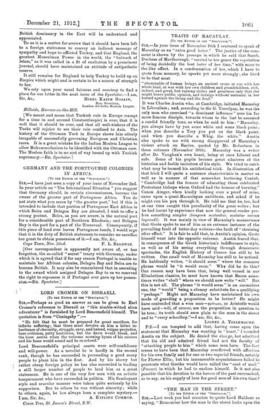TRAITS OF MACAULAY.
(To THE EDITOR Or THE " SPECTATOR.") SIR,—In your issue of November 16th I ventured to speak of
Macaulay as an "extra good hater." The justice of the com- ment is shown by the passage in which be said that Sarah, Duchess of Marlborough, " carried to her grave the leputation of being decidedly the best hater of her time," with more to the like effect. In a condemnation of her, which I have to quote from memory, he speaks yet more strongly ; she lived to be that most "abominable of human beings, an ancient crone at war with her whole kind, at war with her own children and grandchildren, rich, indeed, and great, but valuing riches and greatness only that she might brave public opinion, and indulge without restraint in her hatred against the living and the dead."
It was Charles Austin who, at Cambridge, initiated Macaulay in Liberalism; and, according to Sir G. Trevelyan, he was the
only man who exercised "a dominant influence" over his far more famous disciple, towards whom to the last he assumed a candid friendly tone, as when he said to him : " Macaulay, you always have by you some white and some black paint; when you describe a Tory you put on the black paint, and when you describe a Whig, the white." Austin also spoke to me with strong disapproval of Macaulay's violent attack on Barere, quoted by Mr. Robertson in these columns (November 30th). Macaulay was a writer after Dr. Vaughan's own heart, being at once Liberal and safe. Some of his pupils became great admirers of the historian and feeble imitators of his style. We tried to catch what may be termed his antithetical trick. In illustration of that trick I will quote a sentence characteristic in matter as well as in manner of that somewhat hectoring Cantab.
" Cambridge had the honour• of educating those celebrated Protestant bishops whom Oxford had the honour of burning." Canon Ainger•, when kindly looking over a proof of mine, came upon a quasi-Macaulayan antithesis, and asked if he might run his pen through it. He told me that he, too, had at one time caught this peculiarity of the great writer ; but
he had learnt by experience that now the general reader pre- fers something simpler• (tempora mutantur, mutatur norma loquend(). It was mainly in view of Macaulay's mannerisms that Grote spoke to me of him as an extreme instance of the prevailing fault of latter-day writers—the fault of " straining after effect," It is fair to add that, in Austin's opinion, Grote
himself went into the opposite extreme. Austin feared that, in consequence of the Greek historian's indifference to style, as well as of his seeing everything through democratic spectacles, the English History of Greece has still to be written. One small trait of Macaulay has still to be noticed.
He habitually writes, "it should seem" where the common phrase would be "it would seem." Why did he do this? One reason may have been that, being well versed in our Elizabethan classics, he must have known that Bacon some- times writes " shall" wbere we should now write " will." But this is not all. The phrase "it would seem" is an anomalous one, the "would" being a clumsy substitute for a qualifying " perhaps." Might not Macaulay have maintained his own
mode of guarding a proposition to he better? He might have contended that a wise man—,pfaryiaos, as Aristotle would have said—will, of course, see the proposition in question to be true; its truth should seem plain to the man in the street and to "every schoolboy."—I am, Sir, &c., LIONEL A. TOLLEMACHE.
P.S.—I am tempted to add that, having come upon the statement that Macaulay was wanting in " heart," I sounded Austin on the subject. He denied the charge, but admitted that his old and admired friend had not the faculty of "attaching people to him" which some men have. The fact seems to have been that Macaulay overflowed with affection for his own family and for one or two especial friends, notably for• Flower Ellis; but his innumerable acquaintances failed to penetrate what Goethe would have called the "coat of mail" (Panzer) in which he had to enclose himself, Is it not also possible that his devotion to the heroes of the past encroached, so to say, on his supply of love for good men of his own time ?










































 Previous page
Previous page